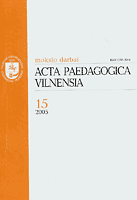Švietimo politika ir ikimokyklinio bei priešmokyklinio ugdymo plėtra
POLICY OF PRE-SCHOOL EDUCATION DEVELOPMENT
Author(s): Giedrė PurvaneckienėSubject(s): Education
Published by: Vilniaus Universiteto Leidykla
Summary/Abstract: In the article contradictions in the policy of education towards the pre-school education and child-care are revealed. Ministry of Education and Science, which is responsible for policy of education, including policy of development of the pre-school education, underestimates the importance of social functions of pre-school education. Legal acts on the preschool education do not take into account the function of full-day care for children which allows their parents (and especially - single parent) to reconcile family and work obligations. The importance of women’s participation in the labour market is discussed. On the basis of analysis of research results, the impact of pre-school education on development and future life style of children from poor families or families at risk is pointed out. At the same time, statistical analysis of the development of the network of pre-school institutions shows the decline in the numbers of pre-school institutions: since 1990, these numbers decreased almost three times in urban areas and more than four times in the rural areas. At the same time the numbers of children attending these institutions are growing since 1993. Children in rural areas (which are affected by poverty the most) and children under three years of age have the lowest access to pre-school education. Special attention is paid to pre-school education of sixyear- olds, which became universal since 2005, but brought even more uncertainties concerning full-day care. The wholistic approach, integrating education and social policies towards pre-school education and care is recommended by the author.
Journal: Acta Paedagogica Vilnensia
- Issue Year: 2005
- Issue No: 15
- Page Range: 176-187
- Page Count: 12
- Language: Lithuanian

